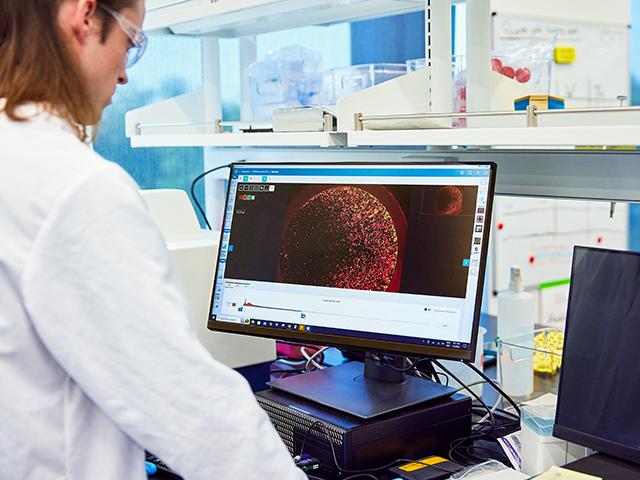Technological Advancements Deliver Improved Crops to Farmers
Tools of the Trait
When Austrian monk Gregor Mendel first experimented with peas in the gardens at the Abbey of St. Thomas, no one understood the mechanisms that control the expression of genetic traits. Yet, for nearly 150 years, plant breeders followed Mendel's example, using crossbreeding methods to increase yield and improve other crop characteristics.
While traditional plant breeding has provided exceptional advancement, it is time and labor intensive. Since the turn of the century, however, new tools and technologies have been developed to speed the discovery process and delivery of improved crops to farmers. Here's a look at three such developments currently in use.
CRISPR
Don't let this gene-editing technique be confused with a drawer in the refrigerator. CRISPR is a powerful tool that works like genetic scissors, allowing scientists to snip a plant's genome at a desired location, then edit by adding new genes or removing existing ones.
"It's a system that essentially can be used in any living organism that has DNA," says Wendy Srnic, Corteva Agriscience vice president of biotechnology. "If you know what you're wanting to change, it can lead to a much faster breeding outcome."
Using traditional plant-breeding methods, the genomes of the plants that are crossed get recombined or "scrambled up," Srnic explains.
"The good things are mixed up with the bad, and it can take years of breeding to get back to only the good," she says. "CRISPR enables you to preserve everything that's already good and make slight changes to the genes that are responsible for the attribute you want to improve. We can get exactly the same outcome as if we had done the crosses, but you're able to do it in one cycle versus many cycles."
P[L1] D[0x0] M[300x250] OOP[F] ADUNIT[] T[]
In 2023, Corteva announced it's using CRISPR to bolster its corn hybrids against four major diseases: Northern corn leaf blight, Southern corn rust, gray leafspot and anthracnose stalk rot. According to the company, these four diseases are estimated to have cost North American corn growers 318 million bushels in production in 2021 alone.
MACHINE LEARNING
These days, data is part of everyday life. Each movie you watch on a streaming service or product you buy online provides a data point for machine-learning models to predict your future viewing interests and buying habits. The more data collected, the better the suggestions become.
At St. Louis-based Benson Hill, this type of machine learning is being used to accelerate the development of crops by combining plant science, food science and data science. The goal is to create crop varieties with specific qualities, such as higher protein content in soybeans or improved flavor in yellow peas. The company calls its platform CropOS.
"We're building machine-learning models that predict performance based on the data we've gathered," says Dave Larson, senior data engineer. "We're starting from years of field performance data, and we're stacking on top that information about composition and food properties. We're able to supercharge the plant-breeding process by building massive simulations to look at all the possible varieties."
Through CropOS, Benson Hill can look at tens of thousands of genes and narrow the pool down to smaller and smaller subsets of genes with the best potential to impact desired plant qualities. Predictive breeding, powered by artificial intelligence, then models tens of millions of possible options.
"It's like a GPS mapping out possible routes to our ultimate destination," Larson says. "CropOS lets us predict which crosses are going to give us the best path forward."
CHIP OFF THE OLD SEED
While a litter of puppies might have the same two parents, they don't all look the same because of slight differences in their genetics. The same holds true for plants. The genetics contained within one kernel of corn may be slightly different than the next -- even on the same cob.
To ensure that its breeding program advances desired traits, Bayer developed a proprietary technology known as seed chipping. A tiny sample, or "chip," is taken from a corn seed. Breeders then analyze the corn DNA and screen it for beneficial traits without the need to grow plants.
"One DNA chip can actually be as representative as an early-stage field trial," says Tom Jury, head of North America field testing at Bayer. "This concept of precision breeding increases the probability that what we're putting in the ground is what the marketplace needs and increases our likelihood of success for the grower."
**
-- Follow Jason on X @JasonJenkinsDTN
[PF_0923]
(c) Copyright 2023 DTN, LLC. All rights reserved.



